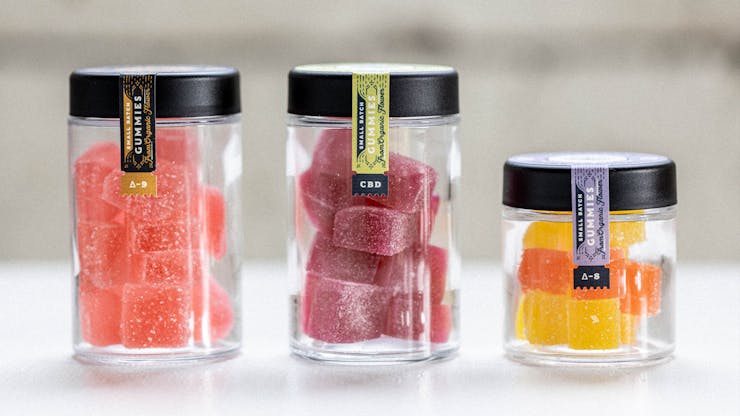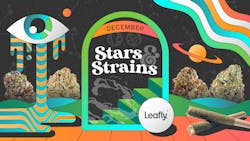In a world of increased access to high-quality hemp products, we help you understand what to look for.
In the current patchwork system of state-by-state cannabis legalization, access to weed and its many benefits has been limited, but limited in a seemly straightforward way: you either live in a state where recreational or medical cannabis has been legalized, or you don’t.
Here’s the thing, though—cannabis and its legal classification are a little more complicated than that. One result of that complication is that people nationwide, including in states where recreational cannabis is not yet legal, actually can have access to cannabis products that get you high and ones that offer other non-intoxicating benefits.
People nationwide, including in states where recreational cannabis is not yet legal, actually can have access to cannabis products that get you high and ones that offer other non-intoxicating benefits.
How’s that, you ask? Well, the key lies in the fact that cannabis actually refers to a genus of plants, and one of the species within the cannabis genus includes what we call hemp. It turns out you can do a lot with hemp, and thanks to a piece of legislation known as the 2018 Farm Bill, it’s legal at the federal level to grow and process for use in consumer products.
In this article, we’ll help break down what that means for you and the range of possibilities from different hemp-based products available to ship nationwide.
Hemp vs. cannabis: the basics
First, let’s talk about hemp and how it’s different from what we think of as traditional cannabis. The terms get a bit confusing in how they’re commonly used versus their actual definitions, but here’s how it all breaks down:
The cannabis genus of plants includes three species, sativa, indica, and ruderalis. While traditional cannabis can be any of these three species, hemp is a sativa species. The naming classification of “hemp” versus “cannabis” was devised to differentiate non-intoxicating cannabis from intoxicating cannabis. While both plants are made up of chemical compounds including cannabinoids & terpenes, cannabis has a much higher naturally occurring concentration of those compounds like THC and CBD.

In differentiating between intoxicating cannabis, which is still classified by the DEA as a Schedule I drug, and non-intoxicating hemp, the 2018 Farm Bill officially classified hemp as an agricultural commodity with the restriction that it must contain no more than 0.3% THC per dry weight to be legal at the federal level. THC causes a high, and in some high-potency cannabis strains, you’ll see a THC percentage of 30% or more.
Hemp is usually grown outside and can be used to make all sorts of things—textiles, building materials, paper—while cannabis is typically cultivated under highly controlled conditions purely for recreational and medicinal purposes.
But here’s where things get interesting: Hemp still contains cannabinoids like CBD and THC that are identical to those molecules in cannabis, simply in far lower concentrations. That means the door is open for enterprising producers to get some pretty exciting stuff out of hemp so long as they follow those two key stipulations of the 2018 Farm Bill, that products are derived from hemp plants and contain no more than 0.3% THC per dry weight.
Understanding hemp cannabinoids
Cannabinoids are the chemical compounds found in cannabis and hemp that contribute to the huge range of effects people experience when they consume weed. From euphoria to pain relief and well beyond, different combinations of cannabinoids unlock a myriad of benefits when they interact with our bodies through our endocannabinoid systems.
You might already be familiar with the two most prevalent cannabinoids, THC and CBD. Both cannabinoids are found in hemp, but while THC produces intoxicating effects, CBD does not. CBD’s clear-headed effects have been studied for a number of therapeutic applications including relief from sleeplessness, pain, inflammation, and anxiety.
THC is the cannabinoid most responsible for the high weed’s famous for. Its effects vary based on the source strain, the amount consumed, and the body chemistry of the consumer, but experiences like euphoria, uplifted feelings, relaxation, sedation, and relief from pain & anxiety are all common.
While THC and CBD are the most well-known cannabinoids present in hemp plants, they’re only the tip of the iceberg. There are more than 150 cannabinoids, many of which have very little research surrounding their effects and potential benefits. The position of cannabis as a Schedule I drug has made it difficult to effectively study the potential from these cannabinoids; however, more flexibility is possible with hemp plants thanks to their federal legality from the 2018 Farm Bill.
CBD vs. delta-8 THC vs. delta-9 THC

CBD
The first wave of hemp-based products post-Farm Bill legalization focused on CBD. Producers either offered products containing CBD isolate extracted from hemp, separating CBD out from other cannabinoids and terpenes to create a CBD-only offering, or products with full or broad spectrum CBD formulas, where CBD is extracted alongside other naturally occurring minor cannabinoids and terpenes to help encourage the entourage effect. CBD-dominant products offer a host of wellness benefits without an intoxicating effect, with relief from pain, inflammation, anxiety, and sleeplessness ranking in the top applications.
Delta-8 THC
Making CBD-dominant products was just the first step in the post-Farm Bill hemp space, however. With more than 150 minor cannabinoids and the language of the Farm Bill making all extracts from hemp containing no more than 0.3% THC legal at the federal level, producers got to work being more creative with hemp’s possibilities.
Delta-8 THC is one such minor cannabinoid that can be extracted from hemp. Delta-8 THC is a cannabinoid found in trace amounts in hemp and cannabis that’s similar in its chemical structure to delta-9 THC. Delta-9 THC is the longer name for what we commonly refer to as simply “THC,” the highly prevalent intoxicating cannabinoid we know and love. While delta-9 THC has a double bond on the 9th carbon in its chain, delta-8 THC has a double bond on its 8th. This double bond structure is thought to produce the intoxicating effect we feel with THC, so delta-8 THC is intoxicating—however, the high it produces is more mellow than with standard delta-9 THC, drawing comparisons to a midway point between CBD and THC, or “THC light.”
Delta-8 can produce more mild versions of standard THC’s effects, including feelings of euphoria and uplift, with consumers also reporting it can be more mild in its potential drawbacks, being less likely to produce feelings of anxiety or paranoia than standard THC.

To make delta-8 THC dominant products, CBD is commonly extracted from hemp and refined into an isolate, and then CBD isolate is synthesized into delta-8. Through this process, producers can make Farm Bill-compliant products that include potent amounts of intoxicating delta-8 THC, so long as they’re hemp-derived and include no more than 0.3% delta-9 THC.
If you’re clever about the ratio of delta-9 THC to other cannabinoids like CBD as well as the total dry weight of the product, you can get a result that’s both Farm Bill-compliant and contains significant enough amounts of delta-9 THC to produce intoxicating effects.
Products that follow these guidelines are legal at the federal level and available to ship nationwide, making delta-8 products accessible in some states where recreational cannabis is not. Check with the producer to confirm which states they ship to, as some states have specific restrictions against delta-8 and others do not directly adopt the language of the farm bill, placing delta-8 in a hazy legal category.
Delta-9 THC
As products including delta-8 and other emerging cannabinoids like delta-10 and HHC are on the rise, some producers are going in a different direction, using the flexibility of the 2018 Farm Bill to go back to basics.
Standard delta-9 THC is found in hemp plants, but the stipulation that products contain no more than 0.3% delta-9 THC per dry weight to be compliant had most companies only including the smallest amount of delta-9 THC in full spectrum formulations or removing THC entirely in favor of selling isolates.
However, if you’re clever about the ratio of delta-9 THC to other cannabinoids like CBD as well as the total dry weight of the product, you can get a result that’s both Farm Bill-compliant and contains significant enough amounts of delta-9 THC to produce intoxicating effects. This works especially well in gummy formats: make a bigger, heavier gummy, and include enough CBD or other minor cannabinoids along with delta-9 THC to get the ratio right, and voila, you’ve got a federally legal delta-9 THC product.
Finding the right hemp gummy for you

Now that you have a better understanding of what’s possible from hemp, how do you find the best products for you? It’s important that you start with a reputable source. Botany Farms is a great example of a brand that checks all the right boxes when it comes to what’s important in quality hemp products. The flower Botany Farms uses to make its extracts comes in small batches from organic farms and is always hang dried and hand trimmed to ensure the purest & most-cannabinoid-rich extracts. Along with this craft-quality source, Botany Farms also ensures you’re getting only the good stuff through its commitment to third-party lab testing. Full certificates of analysis from trusted labs are readily available for each of Botany Farm’s products.
The brand has a full suite of high-quality hemp-based products including flower, tinctures, gummies, and vapes that offer a range of cannabinoid ratios so you can tailor your choice to the experience you’re hoping for. Here’s what you can expect from some of their popular gummy products so you can pick out what’s right for you:
CBD Gummies
25mg CBD per gummy, 12 gummies total
Botany Farms CBD Gummies are a tasty way to feel the wellness benefits of CBD without any intoxicating effects. These little fruit chews include eight different unique flavors packed with natural fruit goodness and 25mg of CBD per piece. Using premium broad spectrum hemp oil, Botany Farms provides a great CBD-dominant choice for folks who want to unwind without losing focus.
Delta-8 THC Gummies*
30mg delta-8, 2mg delta-9 per gummy, 15 gummies total
Delta-8 Gummies from Botany Farms should be a go-to for anyone looking for a high-THC experience. With 30mg delta-8 and 2mg delta-9 per piece, these potent gummies are perfect for the end of the day when you’re done with your tasks and ready to really unwind. As with any cannabis product and particularly with high potency options like this, it’s important to start low and go slow so you can understand how different dosages will interact with your body. Available in a Tropical Mix with peach, pineapple, and mango flavors, these delta-8 gummies are poised to take you on a tasty THC vacation.
Delta-9 THC Gummies
10mg delta-9, 14mg CBD per gummy, 15 gummies total
Want to experience a higher dose of good old-fashioned delta-9 THC? These Farm Bill-compliant watermelon gummies from Botany Farms include 10mg delta-9 THC and 14mg CBD per piece. In order to stay compliant, the gummies are bigger than most, weighing over 5 grams each, and include hemp-derived CBD to get the ratio right and offer broad spectrum benefits. Vegan, gluten-free, and super-tasty, these gummies are a great option for anyone looking to experience standard THC’s benefits in a package that can be shipped nationwide.

Find these gummies and more hemp-based goodness all from Botany Farms. Get your gummy on and scope out the other formats available from Botany Farms at the link below.
*Leafly novel cannabinoid disclaimer:
Use and possession may be restricted by law. This product may expose you to harmful chemical byproducts.






